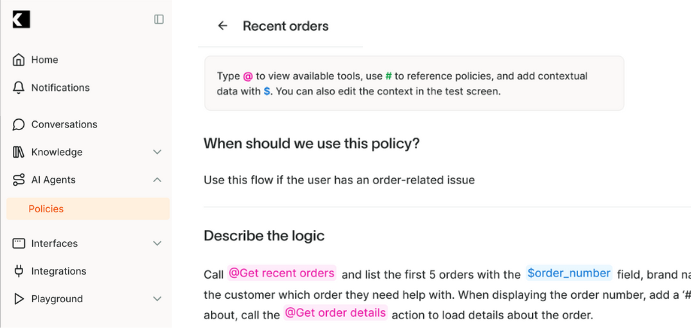Ingredients
The systems used by this policy include ShipMonk, Salesforce Service Cloud, and Kodif.
What are AI Policies?

At Kodif, we’re excited to announce the launch of Policies—a powerful, dynamic solution designed to revolutionize the way CX managers handle customer support. Unlike traditional flows, which are rigid and complex, Policies empower non-technical users to create and manage customer interactions with ease. Written in natural language, Policies make it simple to define and refine customer experiences without needing to rely on complicated flowcharts or scripting. This approach is not only user-friendly but also self-serve, enabling CX teams to quickly translate existing Standard Operating Procedures (SOPs) into automation, saving valuable time and resources.
The flexibility of Kodif Policies ensures that businesses can offer personalized, context-driven support while continuously improving customer experiences. With Policies, you can experiment with different strategies to optimize outcomes such as CSAT, revenue, and retention—all without the need to rebuild complex workflows. Whether it’s automating routine interactions or testing new approaches for high-stakes scenarios, Policies provide a scalable, adaptable solution that aligns with your business goals. While flows still have their place in sensitive, high-risk situations, Policies offer an agile alternative that helps businesses innovate faster and deliver exceptional, tailored experiences at scale.
“WISMO” Ticket Type Explained
“WISMO” stands for “Where Is My Order?” and is a prevalent ticket type in customer support, particularly in the e-commerce sector. These inquiries originate when customers seek updates on the status or location of their purchases. Addressing WISMO tickets efficiently is crucial for maintaining customer satisfaction, as timely and accurate information can greatly reduce customer anxiety and enhance trust. Businesses often implement sophisticated order-tracking systems and proactive communication strategies to minimize the volume and impact of these inquiries, thereby improving overall customer service efficiency.
Which Platforms Does This AI Policy Work On?
This AI policy seamlessly integrates with ShipMonk, Salesforce Service Cloud, and Kodif. Kodif also offers integration capabilities with other major platforms, ensuring that businesses can leverage this solution across diverse systems to optimize their customer support operations.
When Should I Use This Policy?
This policy is ideal for use when customers inquire about the status of their orders. By automating responses to WISMO inquiries, businesses can provide quick and accurate updates, freeing up customer service representatives to handle more complex issues.
Describe the logic:
-
Type @ to view available tools, use # to reference policies, and add contextual data with $. You can also edit the context in the test screen.
-
Ask for the user’s email address
- Use @get_shipmonk_account_details to check if the user with that email address exists in ShipMonk.
- If the email address was not found, ask for a valid email address.
-
If the email address is still not found, route it to an agent for further investigation.
-
Display Recent Orders:
- Use @get_shipmonk_orders to retrieve the user’s recent orders.
- Display the list of recent orders and ask the user which specific order they would like to inquire about.
-
If the order was not found, route to an agent for further investigation.
-
Check Order Status:
- For the selected order, retrieve the shipping status using @shipmonk_order_details(order_id: str).
- If “Approved”, inform that the order was approved and is waiting to be processed.
- If “Processing”, inform that the order was processed and is waiting to be shipped.
- If “Pending Shipment”, inform that the order is pending shipment and provide a shipment date.
- If “Shipped”, inform that the order was shipped and is waiting to be in transit and provide the tracking number.
- If “In transit”, use the tool @shipmonk_order_details to check if the order is within the estimated delivery date. If yes, inform the order is in transit and provide the expected delivery date.
- If no, inform the customer that the route is delayed and that the request will be transferred to an agent for investigation.
- If “Delivered”, inform that the order was delivered and confirm with the customer if the order was delivered.
- If the order was not delivered, route to an agent or create a ticket to escalate for further investigation.
- If “Canceled”, inform that the order was already canceled.
Policy Logic
Use this policy when customers want to know the status of their orders. By implementing the logic outlined above, businesses can efficiently handle WISMO inquiries, providing timely and accurate information to enhance customer satisfaction and operational efficiency.
Example Policy
To illustrate, here is an example of how you might configure a WISMO policy using these tools:
- Ask for the user’s email address
- Use @get_salesforceservicecloud_account_details to check if the user with that email address exists in Salesforce Service Cloud.
- If the email address was not found, ask for a valid email address.
-
If the email address is still not found, route it to an agent for further investigation.
-
Display Recent Orders:
- Use @get_salesforceservicecloud_orders to retrieve the user’s recent orders.
- Display the list of recent orders and ask the user which specific order they would like to inquire about.
-
If the order was not found, route to an agent for further investigation.
-
Check Order Status:
- For the selected order, retrieve the shipping status using @salesforceservicecloud_order_details(order_id: str).
- If “Approved”, inform that the order was approved and is waiting to be processed.
- If “Processing”, inform that the order was processed and is waiting to be shipped.
- If “Pending Shipment”, inform that the order is pending shipment and provide a shipment date.
- If “Shipped”, inform that the order was shipped and is waiting to be in transit and provide the tracking number.
- If “In transit”, use the tool @salesforceservicecloud_order_details to check if the order is within the estimated delivery date. If yes, inform the order is in transit and provide the expected delivery date.
- If no, inform the customer that the route is delayed and that the request will be transferred to an agent for investigation.
- If “Delivered”, inform that the order was delivered and confirm with the customer if the order was delivered.
- If the order was not delivered, route to an agent or create a ticket to escalate for further investigation.
- If “Canceled”, inform that the order was already canceled.


